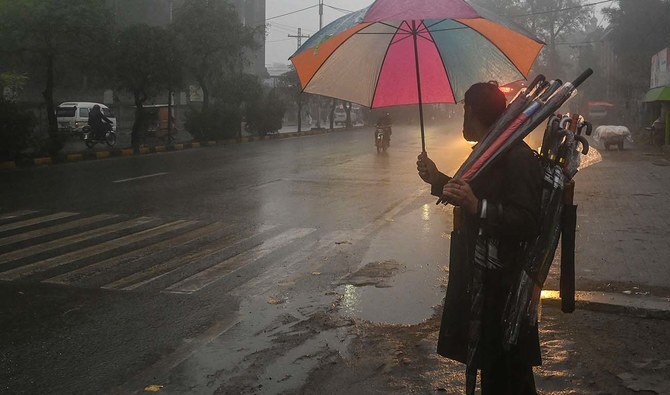ISLAMABAD: Pakistan’s Punjab on Tuesday warned of heavy rains across the province till August 31, urging the public to exercise caution, with nearly 250 people killed nationwide in rain disasters this monsoon season.
Heavy rains since July have triggered floods and landslides in many parts of the country, most notably the eastern province of Punjab and northwestern Khyber Pakhtunkhwa (KP).
Since July 1, Punjab has reported 92 deaths from rain disasters, while KP has reported 74 and the southern Sindh and southwestern Balochistan provinces have reported 47 and 24 deaths respectively.
“An alert for heavy monsoon rains across the province has been issued,” the Provincial Disaster Management Authority (PDMA) for Punjab said on Tuesday. “The new spell of monsoon rains will start this evening [Tuesday] till August 31.”
PDMA said rains were expected in the cities of Rawalpindi, Murree, Galiyat, Attock, Chakwal, Talagang, Jhelum, Gujranwala, Sahiwal, Jhang, Toba Tek Singh, Nankana Sahib, Chiniot, Faisalabad, Kasur, Khushab, Sargodha and Mianwali, Bhakkar, Layyah, Dera Ghazi Khan, Rajanpur, Multan, Khanewal, Lodhran, Muzaffargarh, Kot Addu, Bahawalpur, Bahawalnagar, Khanpur and Rahim Yar Khan.
Due to heavy rains in the Koh Sulaiman range, there was a fear of flash floods in the mountains, the PDMA said, directing commissioners, deputy commissioners, the Water and Sanitation Agency, irrigation department, rescue officials, civil defense and other concerned departments to remain alert.
Punjab PDMA Director General Irfan Ali Kathia said there was a risk of flash floods in the Dera Ghazi Khan, Multan and Bahawalpur divisions.
“Tourists, travelers and farmers should arrange their affairs keeping in view the weather conditions,” he said. “Stay in safe places to protect old buildings from poles and lightning and in case of an emergency call PDMA helpline 1129.”
Pakistan is recognized as one of the world’s most vulnerable countries to climate change effects. This year, the South Asian country recorded its “wettest April since 1961,” with 59.3 millimeters of rainfall while some areas of the country faced a deadly heat wave in May and June.
In 2022, unusually heavy rains triggered flash floods in many parts of the country, killing over 1,700 people, inflicting economic losses of around $30 billion, and affecting at least 30 million people.
















